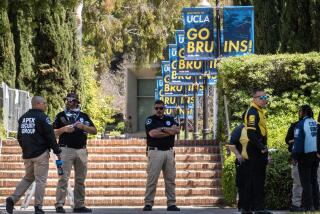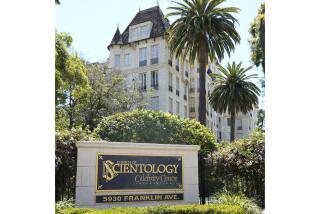Whistle-Blower at Los Alamos Is Severely Beaten
- Share via
An auditor preparing to testify before Congress about alleged financial abuses at Los Alamos National Laboratory was severely beaten after going to a nightclub to meet a person who claimed to have additional information about the lab, the auditor’s wife and attorney said Monday.
The FBI and police in Santa Fe, N.M., said they were investigating the assault early Sunday morning against Tommy Ray Hook. The longtime Los Alamos employee filed a lawsuit this year in which he claimed that lab supervisors at the University of California had retaliated against him and another auditor for blowing the whistle on financial mismanagement.
Hook is one of about a half-dozen workers who have come forward in the last several years with allegations about lax security, poor safety and financial mismanagement at the nuclear weapons facility in New Mexico that has cost taxpayers millions of dollars.
The problems led in part to the Energy Department’s recent decision to open bidding for the contract to operate the lab, which has been held by the UC system since World War II.
Hook was unconscious when emergency medical personnel arrived at the scene, said his wife, Susan. He remained hospitalized in Santa Fe on Monday with a fractured jaw and an injury to his spine, she said. The assault was broken up when a bouncer at the nightclub came out to the parking lot and the assailants fled.
“When they were beating him, they said he needed to start keeping his mouth shut,” Susan Hook said.
According to his wife, Hook was contacted by someone who wanted to provide him with evidence of financial problems at the lab, but a meeting Friday was delayed.
Then Saturday about 10:30 p.m., Hook was awakened at home by the individual, who wanted to meet that night at the nightclub, Susan Hook said.
Her husband made the 50-minute drive to Santa Fe and waited for about an hour. When Hook went back to his car, he was pulled out from the driver’s seat, his wife said. The assailants did not take his wallet, which contained a large amount of cash and credit cards.
At the time, Susan Hook said, she was visiting the couple’s two sons in Albuquerque.
As she described her husband’s condition Monday, Susan Hook broke down crying. She said the couple had planned to celebrate their 30th wedding anniversary this week with a trip to Hawaii.
Santa Fe Police Deputy Chief Eric Johnson said an assault report was made at 2:01 a.m. Sunday. But it was not until Monday that police learned from FBI officials that Hook was a potential congressional witness.
Johnson said officials were examining the possibility that the assault was a case of random violence, as well as the chance that Hook had been targeted.
The matter will be referred to the U.S. attorney in New Mexico, an FBI spokesman said, if it appeared that Hook’s upcoming testimony was the reason for the attack.
Bob Rothstein, Hook’s attorney, said the assault was a clear attempt to intimidate or silence his client.
UC management at the lab “has created an atmosphere in which it is uncomfortable to speak the truth,” Rothstein said. “The university has not encouraged whistle-blowers and, in fact, has created an atmosphere in which whistle-blowers are regarded as enemies.”
UC officials said in a statement Monday that they were “outraged that a laboratory employee was the victim of a weekend assault in Santa Fe.”
Lab Director Robert Kuckuck said in the statement that “any form of physical violence towards an individual is unacceptable. The laboratory is in contact with the Santa Fe Police Department and is providing the laboratory’s full support and cooperation with the ongoing investigation.”
An Energy Department spokeswoman said the matter had been referred to the inspector general’s office for investigation.
Hook’s suit against the university was joined by co-plaintiff Charles Montano, another auditor at the lab. Montano said Monday that he had been dealt with harshly, kept in a small office for nine months and given no work assignments.
“I was a little naive,” Montano said. “I didn’t think this could happen. We are talking about people who have strong opinions about the University of California.”
More to Read
Get the L.A. Times Politics newsletter
Deeply reported insights into legislation, politics and policy from Sacramento, Washington and beyond. In your inbox twice per week.
You may occasionally receive promotional content from the Los Angeles Times.











